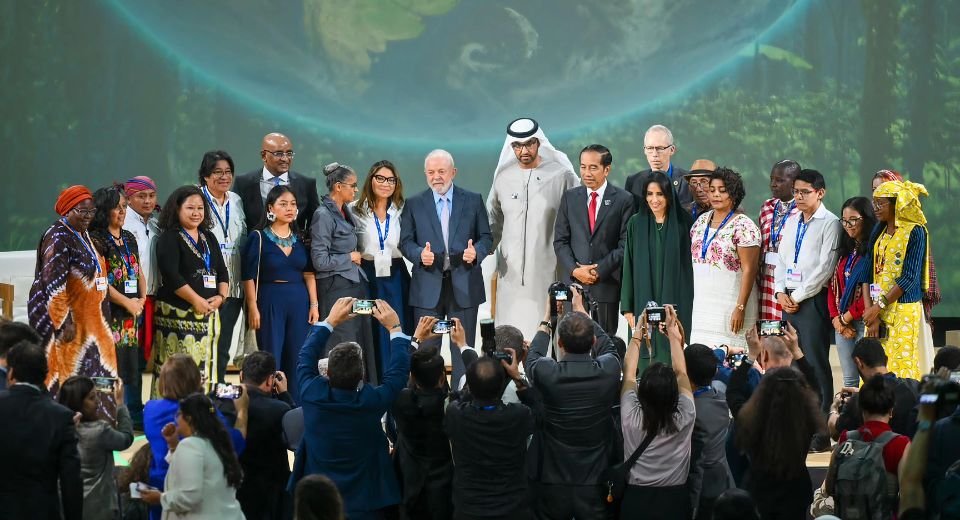HQ Team
December 4, 2023: The COP28 has unveiled a $1.7 billion funding plan to meet climate and diversity goals.
The key objectives include the mobilisation of an early $30 million investment in the Ghanaian government’s ‘Resilient Ghana’ plan and the conservation and development of key forest basins, with finance from governments, philanthropies, and multilateral development banks.
The COP28 leaders emphasised the critical importance of investing in livelihoods and development goals of Indigenous Peoples and local communities, according to a COP28 statement.
Indigenous Peoples represent 5% of the global population but protect 80% of the world’s remaining biodiversity.
The World Climate Action Summit’s 28th session of the Conference of Parties to the UNFCCC (COP28) is being held in Dubai and ends on December 12.
Non-state actors
Ensuring that nature in its total and most holistic form is recognised, supported, and funded as a prerequisite to climate action has been a priority for the COP28 Presidency, said Razan Khalifa Al Mubarak, the UN Climate Change High-Level Champion for COP28.
“This remarkable political leadership coupled with support and finance from non-state actors is a testament to the fundamental role of nature not just for this cop but for all future cops to come.
“In the session, heads of state and government unveiled national and regional investment plans and partnerships focused on nature-climate action to deliver on the Paris Agreement and the recently adopted Kunming-Montreal Global Biodiversity Framework.”
The Asian Development Bank, the OPEC Fund, Saudi Arabia, AFD, France, and the ASEAN Catalytic Green Finance Facility at the Green Climate Fund, announced the Nature Finance Hub initiative for mobilising $1 billion from development partners.
The parties intend to garner an additional $2 billion in additional private finance capital by 2030 for nature-focused climate projects.
Funding commitments
The UAE would contribute $100 million of new finance for nature-climate projects, with an initial $30 million investment in the ‘Resilient Ghana’ plan.
Siaosi ‘Ofakivahafolau Sovaleni, the Prime Minister of Tonga, announced $100 million in funding for Pacific Small Island Developing States from the Bezos Earth Fund for the ‘Unlocking Blue Pacific Prosperity Plan’ to protect 30% of the countries’ waters and exclusive economic zones by 2030 — representing an area larger than the surface of the moon.
A consortium of philanthropies, including Bloomberg Philanthropies, Builders Vision and Oceankind, announced $250 million of new finance under the Ocean Resilience Climate Alliance, targeting protection for vulnerable marine areas, ocean-based mitigation efforts, and research on climate impacts.
President Emmanuel Macron of France confirmed funding for three forest finance packages including $100 million for Papua New Guinea, $60 million Democratic Republic of Congo and$50 million for the Republic of Congo to drive private finance of conservation and local development through verifiable carbon credit transactions.
Indonesian President Joko Widodo and Norwegian Prime Minister Jonas Gahr Støre highlighted a $100 million partnership in support of Indonesia’s pioneering FOLU Net Sink 2030 plan.
Biodiversity framework
These nature-climate plans also drive progress on previous commitments, including COP26’s Glasgow Leaders’ Declaration, which saw 145 countries agree to halt and reverse forest loss and land degradation by 2030, according to the statement.
It also supports the landmark Kunming-Montreal Global Biodiversity Framework agreed last December, which saw 196 countries agree on a common framework to halt total nature loss by 2030.
Nature loss can save $104 billion in adaptation costs and has the potential to provide upwards of 30% of the CO2 mitigation action needed by 2030.
About 50% of global GDP is directly or indirectly dependent on nature and other ecosystem services.
Global stocktake
The conservation and restoration of natural ecosystems supports economic prosperity, with the potential to create nearly 395 billion more jobs and to protect 1 billion people whose livelihoods are directly dependent on nature.
The COP28 will deliver the first-ever Global Stocktake – a comprehensive evaluation of progress against climate goals.
The stocktake is a process for all parties to agree upon a clear roadmap to accelerate progress through a pragmatic global energy transition and a “leave no one behind” approach to inclusive climate action.
